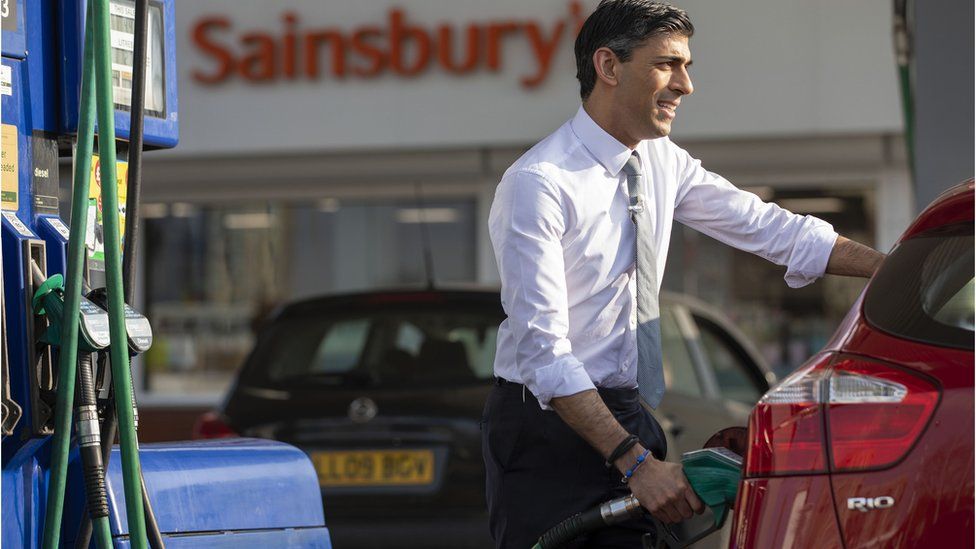
By Harrison Jones
BBC News
Rishi Sunak has been accused of a “very special combination of incompetence and cynicism” over his major change of direction on climate policies.
Former Greek finance minister Yanis Varoufakis told the BBC that the prime minister was “destroying” the UK’s green credibility in a desperate bid to appeal to sections of the public.
But Defence Secretary Grant Shapps said the UK was ahead on reducing carbon.
It follows a significant shift on net zero announced by Mr Sunak this week.
The PM pushed back a ban on new petrol-only cars from 2030 to 2035 and announced delays to several other key green policies.
Some sectors of the car industry backed the government’s change in direction. But many – including Ford – said it undermined planning.
The Green Party co-leader said she felt “a bit sick” after Mr Sunak’s announcement.
Speaking to the Sunday with Laura Kuenssberg programme, Mr Varoufakis – seen as a leading economic voice on the left – launched a scathing attack on the government’s green ambitions.
He told stand-in host Victoria Derbyshire: “It takes a very special combination of incompetence and cynicism to manage to unite the car industry and the Greens against you, and Rishi Sunak has demonstrated that.
“It is very clear that this was the result of the Uxbridge by-election,” Mr Varoufakis said – referring to the narrow Conservative win in the Uxbridge by-election in July, which some commentators attributed to anger at the expansion of London’s Ultra Low Emission Zone (ULEZ).
Mr Sunak was trying to appeal to “nativist, rightish, anti-climate policy segments of the population… destroying all the credibility that governments have tried to build up regarding commitments to net zero”, Mr Varoufakis added.
Yanis Varoufakis accused Mr Sunak of appealing to ‘nativist, rightish, anti-climate policy segments of the population’
On Tuesday, Mr Sunak announced the changes to the government’s stance on green policies, including a delay on a ban of new petrol and diesel car sales.
The PM’s speech, moved forward following a leak to the BBC, prompted fierce criticism from environmentalists, industry leaders and the opposition.
But Mr Sunak, who was also criticised by some in his own party, said he could not impose “unacceptable costs” on British families as a result of attempts to reduce emissions.
Mr Shapps told Victoria Derbyshire that he “entirely” backed the changed deadline on selling petrol and diesel cars, and defended the UK’s green record.
“We have the leading position in the G7 in terms of the amount of carbon that we have reduced,” he said.
The defence secretary argued that the UK had exceeded expectations set out in previous carbon budgets, which place restrictions on the amount of greenhouse gases the UK can emit over five years. Work is now being done on the latest version, which will start in 10 years’ time.
Mr Shapps continued: “We have already identified – even after these changes in pace, to give families some relief – 90% of the things we need to do by 2037, so I am completely confident we will get there as well.”
But panellist Rachel Johnson, a journalist and the sister of former PM Boris Johnson, said: “The lectern that he (Mr Sunak) stood in front of in Downing Street said something like ‘long term decisions for a brighter future’. As I saw it, I thought, no, we are making short term decisions for a darker future… These are populist measures.
“He is equating green with expensive, which is wrong, green is going to be very good for the economy if they grip it.”
The PM says “we have to change how we do politics” as he speaks about climate change and its impact on families.
Mr Shapps did acknowledge the country had “found it difficult” to keep up with the rest of Europe on heat pumps and insulation.
But, he added: “We want to allow more time so we are not penalising households.
“The thing we are not prepared to do is to say to every household within a couple of years… a ban on gas boilers means that perhaps an average home would spend about £8,000 on having to rip out their gas boiler.
“We think that we can both meet our 2050 commitments and give families a bit of a break and enable them to change their boilers as time comes rather than force this sort of pace which is unrealistic.”
Net zero means emitting no more greenhouse gases – such as carbon dioxide – than the amount taken out of the atmosphere.








